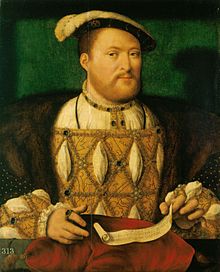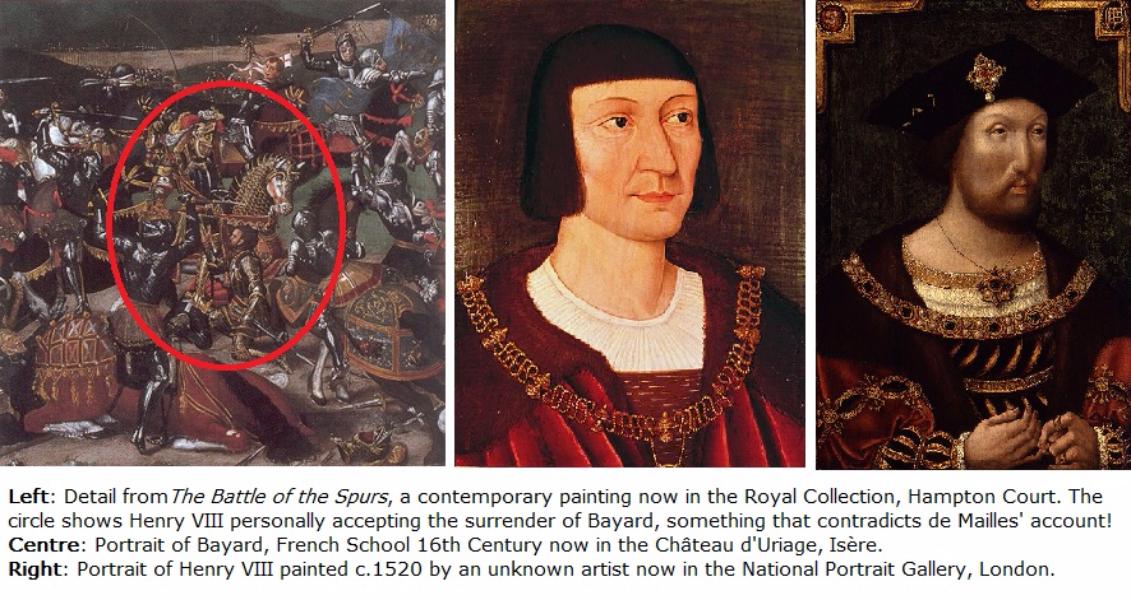
Portrait of Henry painted c.1531 by Jos Van Cleve (formerly attributed to Hans Holbein) now in the Royal Collection
HENRY VIII… CHIVALROUS PRINCE OR BRUTAL KING?
Whole libraries have been written about the despotism of Henry VIII and his murderous marriages but in the early years of his reign the second Tudor king was depicted as an athletic young prince steeped in the ideals of Arthurian chivalry. Whatever Henry became, one contemporary writer at least recorded an episode that complies with the image of Henry as a virtuous prince and, strangely enough, this chronicler was French!
The writer was the French man-at-arms Jacques de Mailles (his name means Jack of the chainmail!) and in his biography of his captain, the Chevalier Bayard, he records the time when Henry was asked to arbitrate in a matter of chivalry concerning his famous master.
The Chevalier Bayard spent his entire life fighting for the French king Louis XII and his successor Francis I. His valiant deeds earned him the nickname of the ‘knight without fear or reproach’ and he is often cited as the last of the medieval paladins to live, and die, by the code of chivalry. So how did this famous French hero come to meet ‘Bluff King Hal’?
In 1513 Henry VIII invaded France in an attempt to press his (highly spurious) claim to the French throne but the road to Paris was blocked by the fortified town of Thérouanne. Henry laid siege to this vital stonghold and among the French army sent to drive the English back to Calais were Bayard and his faithful servant Jacques de Mailles. The ensuing battle was a disaster for the French and it became known (in England) as the Battle of the Spurs due to the speed of the French retreat.
After gallantly defending a bridge, so as to buy time for the main French army to escape, Bayard found himself alone in enemy territory so he started to look for an Englishman who would accept his surrender. It wasn’t long before he found an English knight taking a nap under a tree so, drawing his sword, Bayard pressed the point of his blade into the sleeping man’s neck and declared:
“Surrender cavalier or you die!”
The Englishman awoke with a start and, thinking the battle had been lost whilst he slept, replied:
"I give myself up then, since I am taken in this manner. Who are you?"
"I am," said the Frenchman, "Captain Bayard, but [as I am alone] it is I who must who surrender to you; here’s my sword. I pray you be pleased to carry me away with you. But do me this kindness; if we meet with any English on the road who may offer to kill us, let me have it back again."
The astonished Englishman gladly accepted Bayard’s sword and, according de Mailles, prisoner and escort did indeed have to fight off some Burgundian mercenaries before they made it safely back to the English camp.
After feasting with his prisoner for several days, Bayard demanded that he be sent back to his own lines as the code of chivalry demanded but the two men couldn’t agree on a ransom. Bayard insisted he should be released without payment, as the Englishman had surrendered first, whereas his host maintained Bayard was now his prisoner. Having reached an impasse, the matter was referred to Henry VIII, who was commanding the English army in person.
The King of England was discussing the recent battle with his ally the Emperor Maximilian, who was paying Henry a visit, and de Mailles describes what happened when Bayard entered their tent:
“…The Emperor introduced the King of England to the Good Knight, who was by him welcomed with great cordiality, and made on his part such obeisance as it befitted so high a Prince to receive. Then they began talking of this retreat, and King Henry observed that he had never seen people fly so nimbly and in such numbers as the French, who were chased by no more than four or five hundred horse; and the Emperor and he spake of them in very disdainful terms…”
Bayard counters this less than flattering account of the fighting by claiming that the French had not intended to give battle but were merely reconnoitring the English siege works when they were taken by surprise. At this Henry laughed lustily and declared:
"In good sooth, my Lord of Bayard, if your comrades were all like you, I should soon be forced to raise the siege of this town. But, however that may be, you are a prisoner." This is Bayard’s cue to repeat his claim that no ransom should be paid because the Englishman had surrendered first.
After thinking for a while, Henry agreed that both men had acted within the rules of chivalry therefore neither owed any ransom and that Bayard should be set free on condition that he did not take up arms again for the next six weeks. Before releasing Bayard, Henry desperately tried to recruit the Frenchman but his efforts were in vain because, in the words of his biographer “The Chevalier’s heart was devoted to France”.
For the full text of Bayard’s surrender and his meeting with Henry VIII click here
